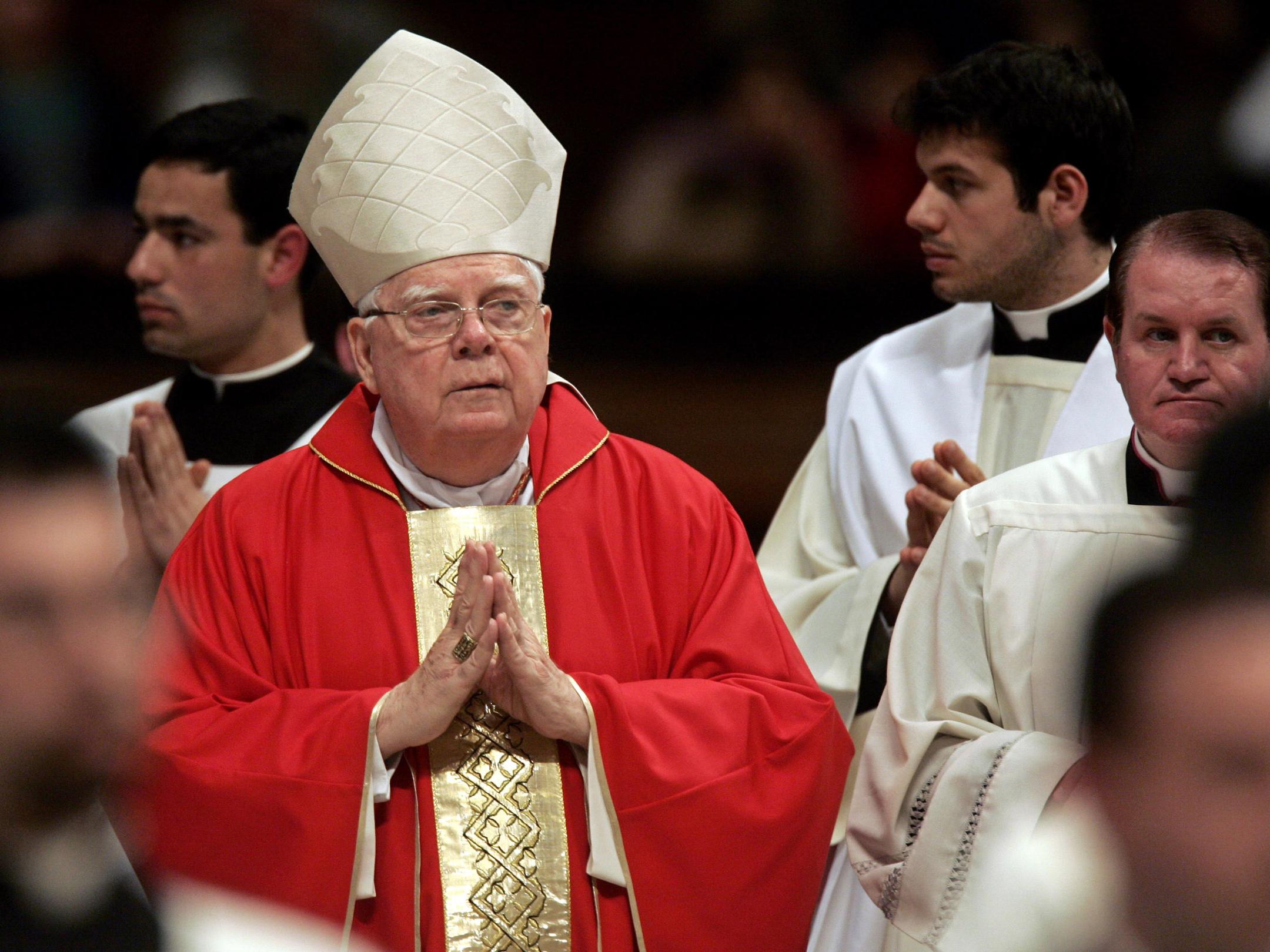Cardinal Bernard Law dead: Archbishop at centre of Spotlight child sex abuse investigation dies aged 86
Highest-ranking Roman Catholic churchman in US resigned in December 2002 over part in alleged cover-up exposed by Boston Globe investigatory team

Your support helps us to tell the story
From reproductive rights to climate change to Big Tech, The Independent is on the ground when the story is developing. Whether it's investigating the financials of Elon Musk's pro-Trump PAC or producing our latest documentary, 'The A Word', which shines a light on the American women fighting for reproductive rights, we know how important it is to parse out the facts from the messaging.
At such a critical moment in US history, we need reporters on the ground. Your donation allows us to keep sending journalists to speak to both sides of the story.
The Independent is trusted by Americans across the entire political spectrum. And unlike many other quality news outlets, we choose not to lock Americans out of our reporting and analysis with paywalls. We believe quality journalism should be available to everyone, paid for by those who can afford it.
Your support makes all the difference.Cardinal Bernard Law, the former archbishop of Boston who became a symbol of the Roman Catholic Church’s worldwide sexual abuse scandals, died on Wednesday, the Vatican said. He was 86.
Law, whose resignation from his Boston post in 2002 shocked the Church and brought abuse into the open, had been living in Rome and was in declining health in recent years.
The Vatican did not give a cause of death but sources close to Law, who died in a hospital in Rome, said he had been suffering from the complications of diabetes, liver failure and a build up of fluids around the heart, known as pericardial effusion.
Law was archbishop of Boston for 18 years when Pope John Paul – who in 1984 had appointed Law to run one of the most prestigious and wealthy American archdioceses – reluctantly accepted his resignation on 13 December 2002, after a tumultuous year in Church history.
Law had offered to step down several times that year, as a succession of devastating stories by The Boston Globe’s Spotlight team showed how priests who sexually abused children had been moved from parish to parish for years under Law’s tenure without informing parishioners or law authorities.
When the pope finally accepted the resignation, it sent shock waves through the American Church and began a trickle-down effect around the world, as the cover-up techniques used in Boston were discovered to have been used in country after country.
The story of how the Globe team doggedly brought the scandal to light in a city were few wanted to cross the politically powerful Church was immortalised in the 2015 film Spotlight, which won the Oscar for Best Picture.
The situation in Boston turned out to be the tip of an iceberg of abuse and its cover-up, where churchmen preferred protecting the reputation of the institution rather than the innocence of children.
Thousands of cases came to light around the world as investigations encouraged long-silent victims to go public, shattering the Church’s reputation in places such as Ireland, and forcing it to pay some $2bn in compensation.
Six months after his resignation the Massachusetts attorney general’s office announced that Law and others would not face criminal charges.
After a period in a monastery in the United States, Law moved to Rome.
In 2004 Pope John Paul appointed Law to be archpriest of the Rome Basilica of Santa Maria Maggiore, one of the four major basilicas of Christendom, whose gold leaf ceiling is said to be made from the first batch of the precious metal Columbus brought back from America.
In relative terms it was an immense fall from grace. Such posts are symbolic and ceremonial.
But victims of sexual abuse were outraged because it gave Law a second career and a golden parachute that allowed him to stay close to the centre of power in Rome and serve as a member or adviser in several influential Vatican departments.
He also maintained the rank of cardinal and participated in the conclave that elected Pope Benedict in 2005.
Before he became ill, Law was a regular on the diplomatic circuit, attending receptions, including many in the gardens of the US embassy to the Vatican.
While Law was the elephant in the room at American receptions for a few years after his resignation, at Italian events he was treated with the same effusive obsequiousness bestowed on all cardinals – something Law appeared to enjoy.
He always declined to talk about events in Boston. “I’m retired from that,” he told a reporter at a reception.
Bernard Francis Law was born on 4 November 1931 in Torreon, Mexico, the son of a US Army official and a musician. He graduated from Harvard University and was ordained a priest in 1961.
His first assignment was in Mississippi, where he received death threats for championing civil rights. As bishop of Springfield Cape Girardeau in Missouri, he opened a home for battered women and a centre to help Vietnamese boat people.
Reuters